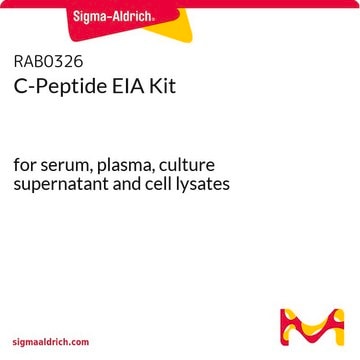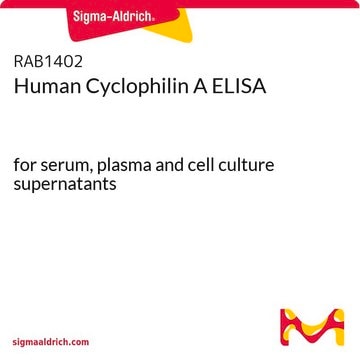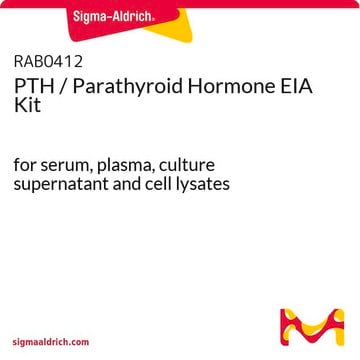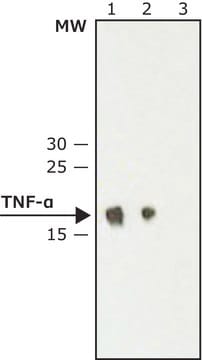RAB1389
Human C-Peptide ELISA
for serum, plasma and cell culture supernatants
Iniciar sesiónpara Ver la Fijación de precios por contrato y de la organización
About This Item
Código UNSPSC:
41116158
NACRES:
NA.32
Productos recomendados
reactividad de especies
human
envase
kit of 96 wells (12 strips x 8 wells)
técnicas
ELISA: suitable
entrada
sample type plasma
sample type serum
sample type cell culture supernatant(s)
assay range
inter-assay cv: <12%
intra-assay cv: <10%
sensitivity: 0.41 ng/mL
standard curve range: 0.41-100 ng/mL
método de detección
colorimetric
Condiciones de envío
wet ice
temp. de almacenamiento
−20°C
Información sobre el gen
human ... INS(3630)
Descripción general
This ELISA antibody pair detects Human Connecting Peptide (C-Peptide)
Aplicación
For research use only. Not for use in diagnostic procedures.
Please refer to the attached Protocolfor details.
Please refer to the attached Protocolfor details.
Otras notas
A sample Certificate of Analysis is available for this product. Please type the word sample in the text box provided for lot number.
Palabra de señalización
Warning
Frases de peligro
Consejos de prudencia
Clasificaciones de peligro
Met. Corr. 1
Código de clase de almacenamiento
8A - Combustible corrosive hazardous materials
Punto de inflamabilidad (°F)
Not applicable
Punto de inflamabilidad (°C)
Not applicable
Elija entre una de las versiones más recientes:
¿Ya tiene este producto?
Encuentre la documentación para los productos que ha comprado recientemente en la Biblioteca de documentos.
Avinash Kharat et al.
Life sciences, 216, 287-294 (2018-11-18)
To induce differentiation of human amniotic membrane derived mesenchymal stem cells (hAMMSCs) into insulin producing cells (IPCs) by treating with somatocrinin or growth hormone releasing hormone (GHRH) and Insulin-like growth factor-1 (IGF-1). In this investigation, we cultivated and characterized hAMMSCs
Kirstine J Bell et al.
Microbiome, 10(1), 9-9 (2022-01-21)
Short-chain fatty acids (SCFAs) produced by the gut microbiota have beneficial anti-inflammatory and gut homeostasis effects and prevent type 1 diabetes (T1D) in mice. Reduced SCFA production indicates a loss of beneficial bacteria, commonly associated with chronic autoimmune and inflammatory
Nuestro equipo de científicos tiene experiencia en todas las áreas de investigación: Ciencias de la vida, Ciencia de los materiales, Síntesis química, Cromatografía, Analítica y muchas otras.
Póngase en contacto con el Servicio técnico







